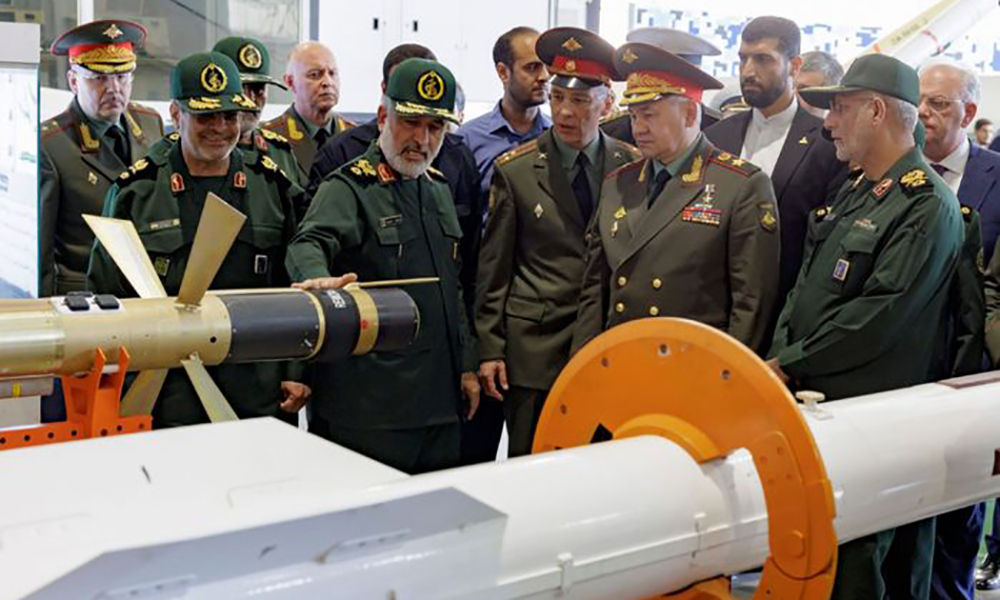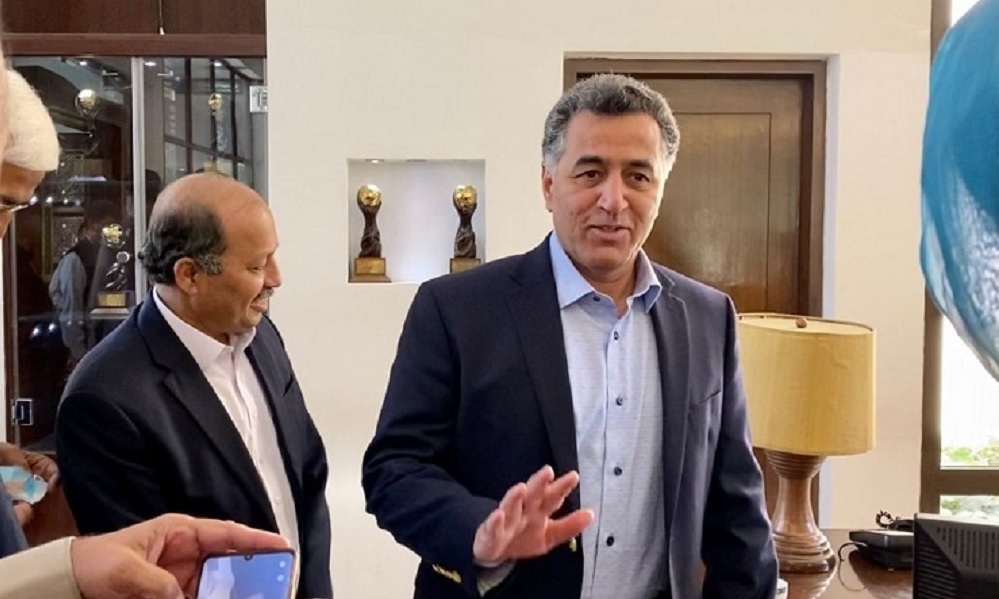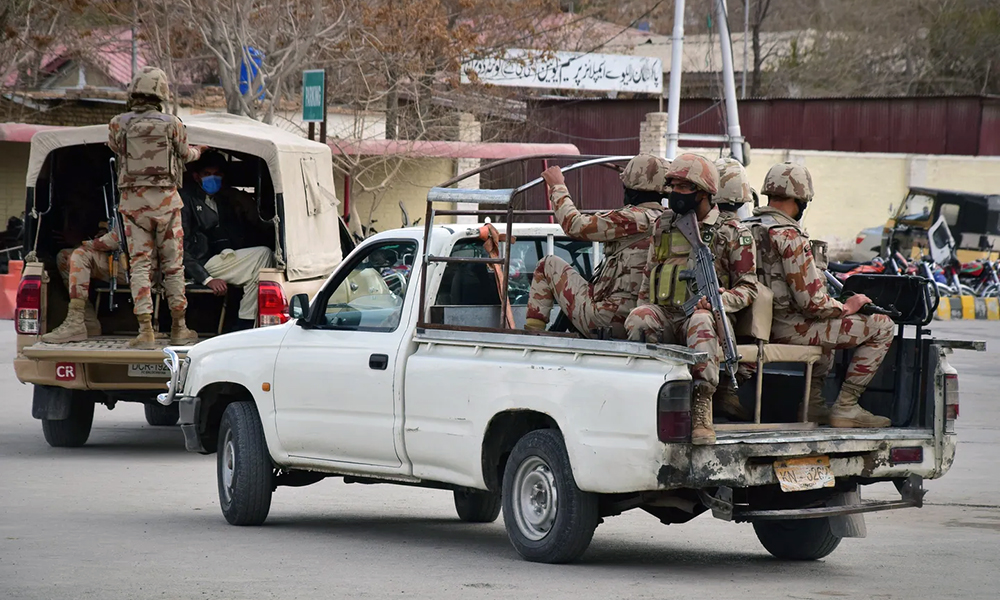Regional
Iran to deliver hundreds of ballistic missiles to Russia soon, intel sources say
Iran’s semi-official Tasnim news agency said in July 2023 that a new training system for the Fath 360 had been successfully tested.

Dozens of Russian military personnel are being trained in Iran to use the Fath-360 close-range ballistic missile system, two European intelligence sources told Reuters, adding that they expected the imminent delivery of hundreds of the satellite-guided weapons to Russia for its war in Ukraine.
Russian defence ministry representatives are believed to have signed a contract on Dec. 13 in Tehran with Iranian officials for the Fath-360 and another ballistic missile system built by Iran’s government-owned Aerospace Industries Organization (AIO) called the Ababil, according to the intelligence officials, who requested anonymity in order to discuss sensitive matters.
Citing multiple confidential intelligence sources, the officials said that Russian personnel have visited Iran to learn how to operate the Fath-360 defence system, which launches missiles with a maximum range of 120 km (75 miles) and a warhead of 150 kg. One of the sources said that that “the only next possible” step after training would be actual delivery of the missiles to Russia, read the report.
Moscow possesses an array of its own ballistic missiles, but the supply of Fath-360s could allow Russia to use more of its arsenal for targets beyond the front line, while employing Iranian warheads for closer-range targets, a military expert said.
A spokesman for the U.S. National Security Council said the United States and its NATO allies and G7 partners “are prepared to deliver a swift and severe response if Iran were to move forward with such transfers.”
It “would represent a dramatic escalation in Iran’s support for Russia’s war of aggression against Ukraine,” the spokesman said. “The White House has repeatedly warned of the deepening security partnership between Russia and Iran since the outset of Russia’s full-scale invasion of Ukraine.”
Russia’s defence ministry did not respond to a request for comment, Reuters reported.
Iran’s permanent mission to the United Nations in New York said in a statement that the Islamic Republic had forged a long-term strategic partnership with Russia in various areas, including military cooperation.
“Nevertheless, from an ethical standpoint, Iran refrains from transferring any weapons, including missiles, that could potentially be used in the conflict with Ukraine until it is over,” the statement said.
The White House declined to confirm that Iran was training Russian military personnel on the Fath-360 or that it was preparing to ship the weapons to Russia for use against Ukraine.
The two intelligence sources gave no exact timeframe for the expected delivery of Fath-360 missiles to Russia but said it would be soon. They did not provide any intelligence on the status of the Abibal contract.
A third intelligence source from another European agency said it had also received information that Russia had sent soldiers to Iran to train in the use of Iranian ballistic missile systems, without providing further details.
Such training is standard practice for Iranian weapons supplied to Russia, said the third source, who also declined to be named because of the sensitivity of the information, Reuters reported.
A senior Iranian official, who requested anonymity, said Iran had sold missiles and drones to Russia but has not provided Fath-360 missiles. There was no legal prohibition on Tehran selling such weapons to Russia, the source added.
“Iran and Russia engage in the mutual purchase of parts and military equipment. How each country uses this equipment is entirely their decision,” the official said, adding that Iran did not sell weapons to Russia for use in the Ukraine war.
As part of the military cooperation, Iranian and Russian officials often travelled between the two states, the official added.
Until now, Iran’s military support for Moscow has been limited mainly to unmanned Shahed attack drones, which carry a fraction of the explosives and are easier to shoot down because they are slower than ballistic missiles.
Iran’s semi-official Tasnim news agency said in July 2023 that a new training system for the Fath 360 had been successfully tested, opens new tab by the country’s Islamic Revolution Guards Corps (IRGC) Ground Force.
Justin Bronk, Senior Research Fellow for Air Power at the Royal United Services Institute (RUSI), a London-based defence think-tank, said: “Delivery of large numbers of short-range ballistic missiles from Iran to Russia would enable a further increase in pressure on already badly overstretched Ukrainian missile defence systems.”
“As ballistic threats, they could only be intercepted reliably by the upper tier of Ukrainian systems,” he said, referring to the most sophisticated air defences Ukraine has such as the U.S.-made Patriot and European SAMP/T systems.
Ukraine’s Ministry of Defense did not have any immediate comment, read the report.
In March, G7 leaders voiced concern, opens new tab at reports Iran was considering transferring ballistic missiles to Russia and warned in a statement that they would respond in a coordinated manner with significant measures against Iran.
The NSC spokesman, in response to Reuters questions, noted that Iran’s newly elected President Masoud Pezeshkian “claimed he wanted to moderate Iran’s policies and engage with the world. Destabilizing actions like this fly in the face of that rhetoric.”
A British government spokesman expressed deep concern at the reports suggesting that Russian military personnel were being trained in Iran. “Iran must not proceed” with the transfer of ballistic missiles, he said.
U.N. Security Council restrictions on Iran’s export of some missiles, drones and other technologies expired in October 2023. However, the United States and European Union retained sanctions on Iran’s ballistic missile programme amid concerns over exports of weapons to its proxies in the Middle East and to Russia.
Reuters reported in February on deepening military cooperation between Iran and Russia and on Moscow’s interest in Iranian surface-to-surface missiles.
Sources told the news agency at the time that around 400 Fateh-110 longer-range surface-to-surface ballistic missiles had been delivered. But the European intelligence sources told Reuters that according to their information, no transfer had happened yet.
Ukrainian authorities have not publicly reported finding any Iranian missile remnants or debris during the war, Reuters reported.
Regional
Pakistan’s ex-spy chief jailed for 14 years in rare military rebuke

A military court in Pakistan jailed former spy chief Faiz Hamid for 14 years on four charges including interference in politics, the army said on Thursday, in a rare conviction of a once-powerful general in the South Asian nation.
Hamid, in custody and under trial since August last year, was the chief of Pakistan’s powerful Inter-Services Intelligence agency from 2019 to 2021 under jailed former Prime Minister Imran Khan, and the two were considered close allies.”The accused was tried on four charges,” the military said in a statement, Reuters reported.
The charges ranged from engaging in political activities and violating the Official Secrets Act in a way detrimental to safety and state interest to misuse of authority and resources as well as causing wrongful loss to individuals, it added.
TIES TO JAILED FORMER PM IMRAN KHAN
The former general was found guilty on all the charges, the military said, without detailing the incidents. His conviction followed “lengthy and laborious legal proceedings”, it added, and Hamid has a right of appeal.
He also faces a separate investigation of his role in May 2023 attacks by thousands of Khan’s supporters on scores of military installations and offices to protest against the arrest of the 72-year-old former cricket star.
Information Minister Attaullah Tarar said Hamid had crossed “red lines” and acted as an advisor to Khan’s party to try to create chaos in the country.
Hamid’s lawyers or family could not be reached for comment. Khan’s PTI party did not immediately respond to a Reuters request for comment.
Khan has been in jail since August 2023.
Khan and nearly 150 of his party leaders and supporters have already been indicted by an anti-terrorism court on charges of inciting the attacks that also targeted military headquarters in the garrison city of Rawalpindi.
Khan and his associates deny the charges.
Hamid’s close ties to Khan, who blames the military for ousting him from power in 2022, were a source of tension between the cricketer-turned-politician and the military.
The military, which has directly ruled the nation of 241 million for more than three decades of its 77-year independent history, plays a big role in making or breaking governments.
Regional
Six Pakistani soldiers killed in TTP attack in Kurram District
Islamabad has accused TTP fighters of using Afghan territory to stage attacks inside Pakistan, a claim Kabul denies, insisting that Pakistan’s security problems are internal matters.

Six Pakistani soldiers were killed and four others injured when militants attacked a security checkpoint in northwest Pakistan’s Kurram district, officials confirmed on Tuesday. The Tehreek-e-Taliban Pakistan (TTP) claimed responsibility for the assault.
The attack took place in the Manato area late Monday afternoon, according to a police officer at the district’s emergency control room. A government official, speaking on condition of anonymity, told AFP that two militants were also killed during the exchange of fire.
Security forces later identified one of the dead militants as local TTP commander Usman Khyberi.
The incident comes amid heightened tensions between Pakistan and Afghanistan, as both sides struggle to maintain a fragile calm following deadly border clashes in October—the worst since the Islamic Emirate took control of Kabul in 2021.
Sporadic skirmishes have continued, including heavy exchanges of fire last week that left at least five people dead.
Islamabad has accused TTP fighters of using Afghan territory to stage attacks inside Pakistan, a claim Kabul denies, insisting that Pakistan’s security problems are internal matters.
Efforts to broker a lasting truce have so far failed. Three rounds of peace talks—facilitated by Qatar, Türkiye, and Saudi Arabia—have not produced a breakthrough.
Regional
Putin questions US punishing India for buying Russian oil
Hours earlier, Modi received Putin at the airport in Delhi, a rare gesture underlining the warm ties between the leaders.

Russian President Vladimir Putin challenged heavy U.S. pressure on India not to buy Russian fuel if the U.S. could do so as he began a two-day state visit, where he was embraced on arrival by Indian Prime Minister Narendra Modi.
Putin spoke in comments to Indian broadcaster India Today, aired hours after landing in New Delhi for a visit during which both countries are seeking to boost mutual trade and expand the variety of items in transactions.
New Delhi and Moscow have strong ties going back to the days of the former Soviet Union, and Russia has been the main source of arms for India for decades. India has also emerged as the top buyer of seaborne Russian oil despite Western sanctions imposed after Moscow launched its invasion of Ukraine in February 2022.
India’s crude imports, however, are set to hit a three-year low this month following a punitive U.S. tariff on Indian goods and a tightening of sanctions on Russia, as U.S. President Donald Trump’s administration says India’s purchases of cheap Russian oil help finance Moscow’s war in Ukraine.
“The United States itself still buys nuclear fuel from us for its own nuclear power plants. That is also fuel,” Putin told India Today.
“If the U.S. has the right to buy our fuel, why shouldn’t India have the same privilege? This question deserves thorough examination, and we stand ready to discuss it, including with President Trump,” he said.
India has said Trump’s tariffs are unjustified and unreasonable and pointed at ongoing U.S. trade with Moscow. The U.S. and European Union continue to import billions of dollars worth of Russian energy and commodities, ranging from liquefied natural gas to enriched uranium.
“There is a certain decline in overall trade turnover during the first nine months of this year,” Putin said when asked if Indian oil purchases had fallen under pressure from the West.
“This is just a minor adjustment. Overall, our trade turnover stands almost at the same level as before.”
He added: “Trade in petroleum products and crude oil … Russian oil, is running smoothly in India.”
Asked how India and Russia should deal with Trump and his tariffs, Putin said the U.S. President has advisers who believe that implementing such tariff policies ultimately benefits the U.S. economy. “We hope that, in the end, all violations of World Trade Organization regulations will be rectified,” he said.
Hours earlier, Modi received Putin at the airport in Delhi, a rare gesture underlining the warm ties between the leaders.
They embraced on a red carpet on the tarmac and then drove away in the same vehicle for a private dinner hosted by Modi.
Senior Russian ministers and a large Russian business delegation were in New Delhi for Putin’s visit and the two leaders will hold summit talks on Friday when they are expected to announce a raft of deals.
“Delighted to welcome my friend, President Putin to India. India-Russia friendship is a time-tested one that has greatly benefited our people,” Modi posted on X ahead of the dinner.
India and Russia aim to raise two-way trade to $100 billion by 2030. Their commerce rose more than five-fold from about $13 billion in 2021 to near $69 billion in 2024–25, almost entirely driven by Indian energy imports.
Bilateral trade eased to $28.25 billion in April–August 2025, reflecting a decline in crude oil imports.
At the same time, India is looking for new destinations to increase exports of its goods hit by the punishing 50% tariff imposed by Trump.
Russia wants to import more Indian goods to balance bilateral trade, which is currently heavily skewed towards energy, Deputy Kremlin Chief of Staff Maxim Oreshkin told a business conference in New Delhi earlier on Thursday.
Indian Trade Minister Piyush Goyal said New Delhi wants to diversify exports to Russia and increase sales of automobiles, electronics goods, data-processing equipment, heavy machinery, industrial components, textiles, and foodstuffs.
-

 Latest News2 days ago
Latest News2 days agoMuttaqi: Afghanistan’s progress requires both religious and modern education
-

 Sport4 days ago
Sport4 days agoILT20: Desert Vipers edge Gulf Giants in historic super over thriller
-

 Regional4 days ago
Regional4 days agoSix Pakistani soldiers killed in TTP attack in Kurram District
-

 Business4 days ago
Business4 days agoTrade bodies warn almost 11,000 Afghan transit containers stuck at Karachi port
-

 World4 days ago
World4 days agoPowerful 7.6 earthquake hits northern Japan, tsunami warnings issued
-

 Latest News3 days ago
Latest News3 days agoTrump calls Afghanistan a ‘hellhole’ country as US expands immigration restrictions
-

 Sport3 days ago
Sport3 days agoCommanding wins for Arman FC and Sarsabz Yashlar in Afghanistan Champions League
-

 Latest News5 days ago
Latest News5 days agoPakistan’s top general calls on IEA to pick between ties with Islamabad or TTP
























